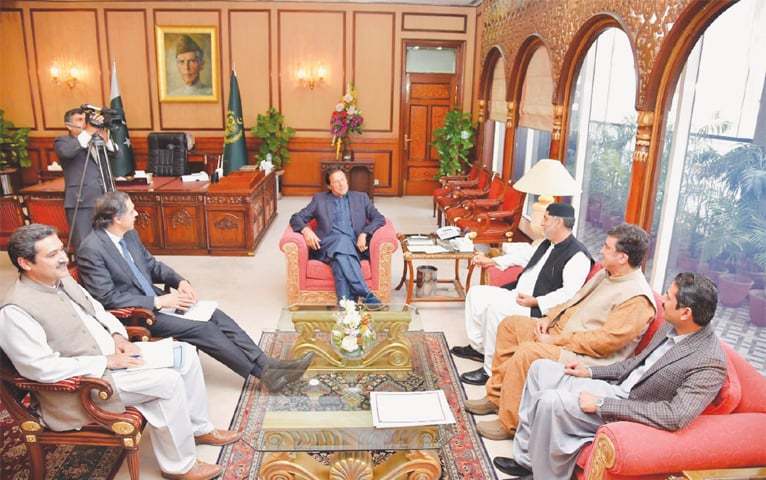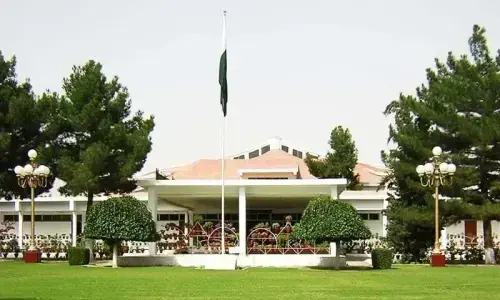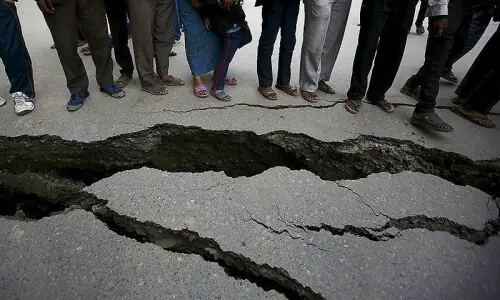The PTI ruling coalition stayed intact for 22 months. Impressive. But not really surprising. When the leader of Balochistan National Party-M Sardar Akhtar Mengal stood on the floor of the National Assembly on Wednesday and announced that his party was leaving the ruling coalition, the muted reaction told its own story. It is a story that may have multiple endings.
Earlier this month, Mengal told some of friends he was at his wit’s end. The pressure from his voters and supporters in Balochistan was building steadily. He had joined the PTI coalition on the basis of an agreement. As per this written agreement, the PTI government promised to do a number of things for Balochistan, including recovery of missing persons, initiation of development projects and starting the repatriation of Afghan refugees. Unlike other political allies, BNP-M did not ask for any ministries etc even though PTI asked the party to join the cabinet.
Nearly two years and many fruitless meetings later, Mengal could boast of negligible progress — if that. A few days ago, according to an insider account, Mengal called a trusted politician and told him he had made a decision to walk out of the coalition. He said he was travelling to Islamabad from Quetta shortly and would make a last-ditch effort to speak with the PTI government.
But speak with whom in the government? Ah, now that is a problem that is drawing a definitive pattern when it comes to PTI’s management of its allies. The manager-in-chief for all these political tasks used to be none other than Jehangir Tareen. He had bagged the electables and he had cobbled together allies and therefore he managed them well. Problem with MQM? Send in JKT; problem with PML-Q? Send in JKT; problem with BNP-M? Send in — you guessed it — JKT.
But what do you do when there is no JKT to send in? When Mengal called the politician he trusted, the politician told him that since JKT was out of the picture, even though he was the original guarantor of the agreement between Mengal and PTI, it was better that Mengal sought out members of the new negotiating committee. On reaching Islamabad, he contacted the PTI committee. Defence Minister Pervaiz Khattak, Planning Minister Asad Umar and Deputy Speaker of the National Assembly Qasim Suri came to see him. Mengal repeated his demand that the written agreement be fulfilled. As usual, they asked for more time. Mengal had run out of time.
But the government doesn’t seem to have run out of time, yet. Despite the departure of four BNP-M votes, the PTI coalition is safe as long as it has in its embrace allies like the MQM, PML-Q, GDA and BAP. This is why cabinet ministers do not appear too concerned that Mengal has walked. A senior BNP-M leader, speaking from Quetta, said PTI had now tasked Speaker of National Assembly Asad Qaiser and Adviser on Parliamentary Affairs Babar Awan to engage with Sardar Mengal. Chances of a breakthrough are negligible.
No one in PTI should however underplay the departure of Sardar Mengal. Votes may not matter for now, but optics do. Signals do. Symbols do. PTI has had a poor record in managing allies as evidenced by recurring problems with one party or the other. Problems with PML-Q flared up a few months back but for now there exists an uneasy truce for mutual benefit. Chaudhrys know how to flex muscles and when to flex them. They have their development funds and the administrative clout they needed. PTI realised the vulnerability of its position in Punjab and the PML-Q got a good deal (though not the federal ministry promised to them initially).
MQM bargained hard with PTI, pulled out its federal minister, sulked its way back to Karachi, held talks and finally got most of what it wanted (though a dispute over some funds still festers like a political wound wrapped in a soiled bandage).
And now come whispers about disgruntlement from the Balochistan Awami Party (BAP). Some MNAs from BAP have been heard complaining that PTI is giving development funds directly to the BAP MPAs instead of routing them through MNAs as is the customary practice. This weakens their position, say the MNAs. They are getting restless.
In fact, so are many PTI MPAs in Punjab. Here too the bone of contention is funds for constituencies and the MPAs’ requirement for transfer, postings of local officials. The grumblings are getting louder. Recently a PTI leader close to the prime minister was sent to smoothen feathers in Punjab. The outcome remains unclear.
In short, there is unease everywhere.
Is the red light flashing? Not really. What is happening however is a slight alteration of balance in the relationship between PTI and its allies. Akhtar Mengal’s departure from the coalition has brought this shifting balance into sharper focus. In this relationship, PTI has got a bit weaker and the allies a bit stronger. MQM, PML-Q, GDA and BAP may not walk out like Mengal did (it made political sense for him, it doesn’t for them), but their threat of walking out will now hold greater weight for PTI. Do not be surprised if you see the allies becoming a bit more vocal in their grievances, a bit more aggressive in their dealings and a bit more demanding in their requirements.
They may do all this because they can see the larger political canvas groaning under the weight of PTI government’s problems. The inflammable Justice Faez Isa case in the Supreme Court, the worsening situation of Covid-19, the southward trajectory of the economy all crackling under the larger umbrella of strategic developments (and possible threats) in the region — this is a potpourri that weighs heavy on a fragile government. The allies have their ears to the ground.
The budget will pass. No one wants any crisis before that. Post-budget however there may be all kinds of quiet pulls and pushes where power will be negotiated at multiple levels. PTI has opened too many fronts. It will need to pull many rabbits out of its hat to ensure no front climbs up an escalatory ladder. But who will manage these delicate tasks? The prime minister may need this person sooner than he thinks. There is a vacancy in PTI and the advertisement may read: “Wanted — JKT, who is not JKT.”
Governance can wait. Politics can’t.
Published in Dawn, June 18th, 2020

































